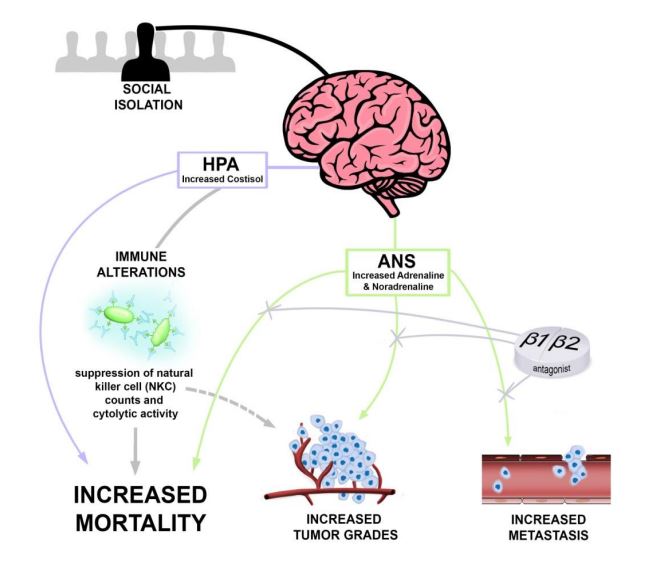
It might come as no surprise that the social environment has been shown to be a determinant in health and well-being and can have a dramatic effect on the pathophysiology of a wide range of diseases, including breast cancer.
Several studies have identified social isolation as one of the main risk factors for cancer-related mortality. A common explanation is that socially isolated individuals do much worse due to the lack of instrumental support.
However, a review published in Breast Cancer Research today suggests an alternative explanation: socially isolated individuals seem to have a physiological milieu that promotes mammary tumor growth.
Social engagement and quality of life
Although few studies have directly assessed the effects of social isolation on outcomes, there is growing evidence that social engagement can extend the lives of breast cancer patients and result in a higher quality of life after diagnosis.
There is growing evidence that social engagement can extend the lives of breast cancer patients and result in a higher quality of life after diagnosis.
Social isolation can be defined and quantified either based on objective criteria, such as social network size and frequency of interaction with others, or subjective criteria, like the individual’s perception of isolation which we commonly refer to as ‘loneliness’.
A study conducted in 2006 by Kroenke et al. showed that women who experienced pre-diagnosis social isolation had a 66% increase in risk of all-cause mortality as well as a two-fold increase in risk of breast cancer-related mortality compared to a socially integrated cohort.
Interestingly, a follow up study by the same group in 2013 found that women with small social networks and low social support were at a higher risk of breast cancer-related mortality than women with a small network but high social support. In contrast, women with large social network but high social burden were shown to be at an increased risk of breast cancer-related mortality.
Stress-related hormones
When compared to other cancers, association between social isolation and cancer progression has been found to be the highest for breast cancer. Several authors speculate that this might be due to the effect the social environment may have on immune, and in particular endocrine, function.
Social isolation has been shown to be a highly potent stress factor for humans, and ‘loneliness’ has been demonstrated to correspond with an increase in circulating stress-related hormones. Socially isolated individuals tend to exhibit increased activation of the hypothalamic-pituitary-adrenal (HPA) axis and adrenergic nervous system (ANS).
Among breast cancer patients, increased cortisol is associated with reduced natural killer cell count and cytotoxicity, as well as increased risk of early mortality. It is also assumed that increased concentrations of endogenous adrenaline and noradrenaline promote tumor development, metastasis, and tumor progression.
This hypothesis is supported by the finding that the use of β1β2 receptor antagonists for other health conditions is associated with less aggressive tumors and reduced early mortality in breast cancer patients.

The patient perspective
When speaking to Breast Cancer Now patient advocates about the effect social environment had on their well-being, Susan, who was diagnosed with HER2-positive breast cancer, mentioned that she attended a breast cancer support group once a month:
“Prior to these meetings there was nothing for secondary breast care patients, so for a long time l felt as if l was on my own, not always wanting to discuss things with my supportive family and friends. Having others to talk to in the same position meant that we could share our experiences and help each other, making new friends along the way.”
Another patient we spoke to called Joan, who was treated for invasive ductal carcinoma, did not attend any support meetings:
“I felt at the end of the excellent treatment that I just wanted to forget all about it, but of course it did not work like that, and in hindsight I think that the support meetings would have been beneficial.”
She has since been involved as a patient representative in a breast cancer survey at a hospital: “I have realized that the whole experience will never completely go away, and that I am living with it, whilst getting on with my life.”
For more information on breast cancer support groups in the United Kingdom, please visit the Breast Cancer Care website and find a meeting in your area.
Comments